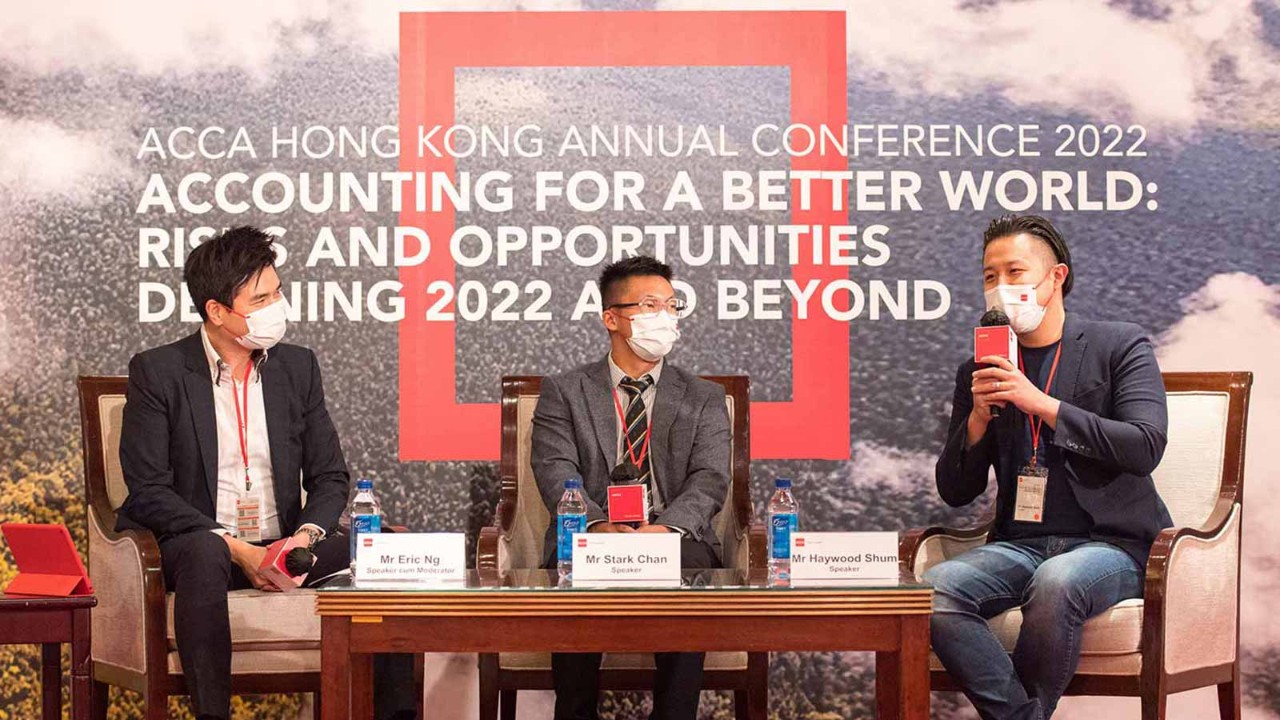
Business environments and day-to-day working operations related to accounting and finance have been reshaped by technology and fast digitalisation. In the future, the role of finance teams is likely to shift, said speakers at the recent ACCA Hong Kong annual conference.
The role of accounting has developed along with changing needs, not least of which is the need for greater sustainability, which is at the very heart of finance, said Narayanan Vaidyanathan, ACCA’s head of policy development.
‘The mission of technology is to help free up people from manual work and to generate business insights’
‘Organisations need to get executive-level buy-in for climate action, which cannot be done by someone not from the senior level. In the meantime, it has to be embedded in strategy as opposed to an add-on conversation or charity,’ he said.
Organisations need to put a sustainability governance structure in place, adopt science-based targets, and link targets to operational needs and requirements. Finance teams can help going forward by generating transactional efficiency, ensuring compliance and control, and providing business insights.
‘We saw a trend that small and medium enterprises [SMEs] were used to sending manually heavy tasks to the accountant, but there are not many people willing to conduct these kinds of tasks,’ said Haywood Shum, CEO and co-founder of Binery, a digital accounting solutions provider for SMEs. His company created software to help with those manual tasks.
‘The repetitive tasks can be done by technology, that is for sure. The accounting function should not serve only as a supporting role in the back-office, but to integrate with business operations and bring more value to the company,’ added Eric Ng ACCA, chief strategy officer at KOS International Holdings.
‘Accountants need to upscale themselves’

Upskilling
Shum said that a CFO or an accountant may have a better understanding of company performance than other professionals, and can, therefore, help other teams such as sales or production with metrics. ‘Accountants need to upscale themselves,’ he said.
And the number of opportunities to upskill is likely to grow.
‘Having digital skills is not asking accounting professionals to become a programmer or simply adopt technology, but to consider a delivery model, create a business model and add value with better use of technology,’ said Narayanan.
This will certainly require a balanced mix of skills and can start with small steps.
Future-ready
The evolution of technologies such as cryptocurrencies and non-fungible tokens (NFTs) also creates challenges such as tax claims for the accounting industry to tackle, Chan told the conference.
‘Blockchains could help as they track every step of an audit trail and cannot be modified by a third party,’ said Ng.
Apart from understanding new technologies, accounting may be moving towards offering total solutions.
‘Clients are expecting more solutions from CPA firms, not only accounting and audit, but also business, taxation or even legal advice,’ Ng added. Offering a one-stop solution to clients will increase the cost for them to switch service provider and enhance customer stickiness.
‘Although some big corporates are adopting flexible working, there is still a huge gap’
Resource reallocation
Speakers agreed that there is a growing focus on workplace diversity, leader transparency and employee wellbeing. Business decision-makers should also now consider the reallocation of their resources in terms of location of staff, human capital and development.
Shum said that, given the evolution of work and the impact of Covid-19, employees might ask for more flexible arrangements such as working remotely. Ng agreed that work-from-home policies have forced employees to think about the importance of work-life balance.
‘Although some big corporates are adopting a flexible working mode, there is still a huge gap,’ said Shum.
As more Generation Z staff join the workplace, changes are in the offing. This generation demands and expects more communication, attention and flexibility, said Ng.
Chan added that sometimes start-ups may offer a greater sense of fulfilment and purpose to younger staff, who can experience different functions in one company and truly know the company’s business.
Shum pointed out that working remotely has its pro and cons – for example, his company can tap the global talent pool – but the cons remain that the company still needs to put a lot of effort into building trust among teammates.
More information
Read our articles on the ACCA Hong Kong annual conference, ‘Strengthening Hong Kong’, ‘Building connections in Asia’, and ‘An end to virtual laissez-faire’
Watch a video of the panel discussion on the future of work at the ACCA Hong Kong annual conference